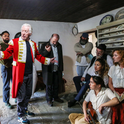Just move your belly a little bit to the left," says artist Katie Sarra to her client, loading her brush with a thick dollop of pinkish paint. Her client is Baz, also known as Baz Lightning. On his 32nd birthday he was struck by lightning which melted the gold chain around his neck. A scar runs down his torso, tracing the path of the bolt as it leapt towards the metal key in his pocket, leaving his body wasted.
A specialist in abstract erotic art, Katie is painting Baz's body, which now resides permanently in a wheelchair. Her curtained studio is set up in Pleasure Island, a large tent in the disabled field at Glastonbury. Run by the charity Outsiders, which campaigns for the acceptance of disabled people as sexual partners, the tent houses a masseur, reflexologist, yoga practitioner, make-up artist and a hairstylist, all of whom provide respite from Glastonbury's feral crowds.
It is not just the disabled who are well catered for now. Along with the carloads of middle-class families and their Thule car-roof boxes is a cross-section of the British public, many of whose only brush with counterculture is a weekly trip to the recycling bins. Gone are the travellers' vans, the CND logos, the cesspits and hedgerow shits, ousted are the scallies and their bags of magic mushrooms, the thieving yardies and motorcycle gangs lurking in the next field to yours. In little over ten years, British festival culture has transformed itself from a filthy, often fearsome, teenage rite of passage into a sanitised national pastime, as essential to the summer as Wimbledon or Goodwood.
***
Traditionally, festivals provided sanctuaries in which to frolic, take drugs and "protest" free from the finger-wagging censure of parents. But the recreational interests of different generations are no longer competing. People who were teenagers in the 1970s now have children—grandchildren, even—of their own, but are still seeking pleasure in the same old ways: in music, hedonism and camping. With more of the older generation attending, festivals are no longer somewhere where youth culture can be shaped. And the liberation from grown-up responsibilities that the young enjoy is still sought by some of their parents too. Sightings of parents high on ecstasy with babies bound in slings to their bodies are not uncommon. One GP remembers an extreme case of parental neglect when, in 2005, she worked as a doctor at the Big Chill, a weekend of dance music in the Malvern Hills: "A child turned up lost and distraught and despite attempts to find her parents they didn't come looking for a very long time. Eventually, after several hours, the mother arrived looking decidedly unconcerned, probably intoxicated. I think she was thrown out."
Rising costs are a more prosaic reason why festivals no longer divide the generations, but bring them together. In the 1970s and early 1980s Glastonbury was part of the so-called free festival movement, which peddled romantic notions of love, community, and natural living. Its principle of charging nothing meant that, in theory anyone who wanted to go, could. In reality it attracted large numbers of dropouts, later known as travellers or crusties, and disaffected youths. Every summer, a long, slow procession of camper vans and converted Bedford ambulances would arrive from the first of the free festivals, Stonehenge, where their occupants had already spent a week watching bands while waiting for the solstice. There were no ticket inspections and no need to jump the fence. In those days all the Glastonbury action—or what little of it there was—happened in one field. You could walk from one end to the other in a few minutes.
Today, ticket prices for big festivals average nearly £150. Add travel, camping equipment and "refreshment" and many young people are priced out of the experience. With youth unemployment and housing costs high, increasing numbers of twentysomethings are still living at home, and look to their parents to fund such luxuries. A festival weekend for four can cost over £1,000; many families, therefore, band together.
For a salaried older generation, meanwhile, festivals are good value. Forget the half-empty field and solitary stage of the 1970s. The large sums of money generated from ticket sales now fund so many acts—big names and unknowns—that along with hundreds of stalls, sideshows, restaurants, trinket stores and random happenings, the choice of entertainment can be dizzying. Glastonbury's website boasts of "lots of different festivals converging on the same gorgeous countryside" over the 900-acre grounds. Divided into 20-odd areas, such as Shangri-la, the apocalyptic Trash City and hippie Green Fields, each sector has its own character, attracting a clientele who are drawn back year on year. Experiencing the whole site over one weekend is impossible. Accommodation too, has changed beyond all recognition—the civilised boutique campsites that attach themselves to the main festival camping grounds, with their luxuriously furnished yurts, teepees and "podpads," are a major draw for fair-weather campers. Hot showers and cappuccinos are thrown in for free.
For many, though, this commercialisation of festival culture has come at a price—entering the perimeter fence used to be about leaving consumerism behind. Now wallets have to come out at every hedgerow. My friend Nigel, a recording artist who often performs at the festivals, is scathing about it: "I was at Glastonbury the year the toilets floated away [2005], when people were rolling in the sewage. Even in the rain, stallholders were trying to fleece me. It was a complete rinse."
***

The biggest threat to the spirit of the new festival movement came in 2001 when farmer and Glastonbury founder Michael Eavis was forced to cancel his event. An estimated 100,000 gatecrashers had flooded the site in 2000, breaching the terms of its licence and putting lives at risk. Security and facilities were stretched beyond reasonable limits, while the anarchy that followed was, to more sheltered souls, nothing short of terrifying. Faced with huge logistical challenges, Eavis took a risk and sold a 20 per cent stake to Vince Power's Mean Fiddler Music Group, which at the time ran many of London's best-known music venues, including the Astoria and the Jazz Café. The Mean Fiddler already had control of rock festivals at Reading and Leeds, and was rapidly expanding out of venues into a more lucrative festival market. For many this commercialisation of Glastonbury was the final straw, another example of capitalism's ability to swallow up counterculture and sell it back at a profit. But what exactly did this precious counterculture consist of?
An archive photograph of Glastonbury in 1977 shows the few hundred young attendees sitting on the grass looking well behaved, if not a little earnest—more like a church congregation in manner than the leaders of an active counterculture. Some of them are naked, a fact that didn't escape the male clientele of Glastonbury's local pubs, who tipped out at closing time to watch. One can only speculate about the feelings that lie behind the expressions in the picture: was it the solidarity of a protest group defined by its music and clothing (or lack of it), railing against the greed and general unpleasantness of society? Or the passivity, ennui and nihilism of a hedonistic drug culture clueless about what to do next?
Either way, as Glastonbury grew it began to attract competing gangs of drug pushers and undesirables who would invade the site, avoiding the new entrance charge which raised money for CND, and behaving in wild and intimidating ways. For some this was the whole point—surviving a festival was a teenage rite of passage—but people were beginning to get robbed and hurt. So when Mean Fiddler stepped in, its promise to tighten security and improve organisation while keeping the festival's spirit aflame was welcomed. In the following years, facilities began to improve and gatecrashers were kept out. Mean Fiddler's stake in the festival rose to 40 per cent. More like a free-range circus than a free state, Glastonbury had retained its founding spirit while allowing a commercial concept of counterculture as spectacle to emerge. With a safer, more benign atmosphere, the festival has now expanded to accommodate 178,000 souls. And despite the commercialism and the proximity of parents, it is more popular than ever with young people. They are less likely to get robbed, and with more medical help on hand those skunk-induced panic attacks can be quickly quelled with a friendly oxygen mask.
"Festivals haven't lost anything," says Ali Fletcher, 26, manager of record label Fullfill which had two acts performing at Glastonbury this year. "Maybe if you go to do mushrooms, and watch blokes juggling things on bits of string with flamethrowers you'll find less of that. But it's still there, and there's a lot more other stuff going on too. Festivals are appealing to a lot more people now." Since the age of 14, Fletcher has been to every major British festival at least twice, as well as some of the bigger European affairs. With up to 30 major festivals in Britain every year, deciding which one to attend is as crucial to him as where he hangs out when he gets there. "When I was a teenager, me and my friends would choose one festival to get trashed and do bonding—we'd smoke lots and drink cider—and one festival to see the best musical acts of the day. Glastonbury combines the two. It's a British institution."
***

The abandonment of musical tribalism in favour of a much more eclectic mix of artists and genres is also part of the transformation. Many festival curators now book acts across a range of musical styles, something unthinkable 20 years ago. A reflection, perhaps, of the new ways in which we are accessing and listening to music. New points of delivery, such as the online subscription service eMusic, streaming sites like Spotify and iTunes radio offer a huge diversity of material from a single webpage. On iTunes radio alone, over 3,000 individual stations offer genre-led playlists, from Cajun rock to Christian folk. Spotify's radio option allows us to mix 1970s reggae with pre-war jazz, or 1980s pop with alternative rock.
The speed at which we can now explore music, and the vast quantity of free clips and files available mean we take less risks with our money and more with our ears. The outlook for the commercial music industry may be bleak, but music itself is experiencing an unprecedented realignment of its audiences. Gone are the musical identities created by an obsession with Maria Callas or the Jam. And nowhere is this trend better reflected than at festivals.
Probably the most eclectic festival to hit British pastures in recent years is Latitude. Now in its fourth year, it is the brainchild of Melvin Benn, managing director of Festival Republic (formerly the Mean Fiddler Group), and probably the most influential person in festivals today. Billed as "more than just a music festival," Latitude is indeed closer to an arts festival and features poetry, literature, theatre, and comedy. Radio 4 was there, making it as attractive to the cultural elite as Bath or Hay-on-Wye. In musical terms, however, it was most remarkable for its range of artists. In addition to its pop, rock, folk and cabaret acts, this year saw the Britten Sinfonia perform classical works. Also billed were ROH2, the contemporary wing of the Royal Opera House, and Sadler's Wells wheeled out act 1 of Swan Lake. Festivalgoers—and more importantly curators—are ignoring the old genre divisions.
While festival counterculture may long ago have been privatised and commercialised, another, more universal spirit has taken its place. Whether it's the fancy dress of the Isle of Wight's Bestival, the silliness of Spinal Tap and Four Poofs and a Piano at Glastonbury, the comedy and cabaret at Latitude, the swilling of beer, the consumption of exotic foods and drugs at all of these events—not forgetting the fornication under canvas—the spirit of carnival comes in many guises. That the British have finally found their outlet for this most essential of human forces, albeit in fenced-off arenas with hundreds of police on patrol, can only be marvelled at. At the heart of this lies the old idea that irrespective of background or age we all deserve a break from the daily grind. Whether you're a moody teenager or a wealthy careerist, a summer weekend in a field issues a small but significant challenge to our usual way of life.












